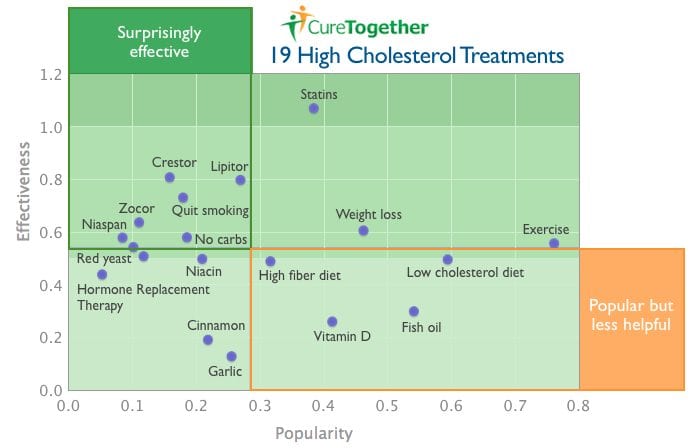 For the live-updated, fully-labelled, interactive version of this infographic, click here.
For the live-updated, fully-labelled, interactive version of this infographic, click here.
By Alex Carmichael, Co-Founder of CureTogether
If part of your plan for 2014 is to eat healthier, exercise, and lower your cholesterol, this post is for you! Some of the most popular treatments for High Cholesterol are not necessarily the most effective, according to a new study by CureTogether, a free resource owned by 23andMe that allows people to share information about their health and treatments.
Participants in the study said they found that some drugs – including Statins, Crestor, and Lipitor – were the most effective. Conversely some popular treatments such as Fish oil and Vitamin D were among the least effective, according to the study. High Cholesterol affects millions of Americans. Finding treatments that work well is important to improve quality of life, so CureTogether asked people living with High Cholesterol to rate the effectiveness of different treatments.
CureTogether’s study compiled responses from 1,862 people with High Cholesterol, who rated the effectiveness of 19 different treatments. Among the most helpful treatments were statin drugs, weight loss, exercise, and quitting smoking. Also effective for those in the study were diet changes including reducing carbohydrates. The people in the study also said that cinnamon and garlic – both folk remedies – were not as effective.
1. Statins
2. Crestor
3. Lipitor
4. Quit smoking
5. Zocor
6. Weight loss
7. Niaspan
8. No carbohydrates
9. Exercise
10. Red yeast rice
Where did this data come from? This is the result of a four-year CureTogether study on High Cholesterol, in which people suffering from the condition shared information about their symptoms and what treatments worked best for them. We’d like to thank those who participated. And just as they shared their experience with High Cholesterol treatments, we’re freely and openly sharing the results of the High Cholesterol study.
This is part of a regular series of CureTogether research findings. CureTogether’s research findings are different than those made by 23andMe, which look at genetic associations with illness, traits and drug response. But as we continue our work with the CureTogether community, 23andMe hopes to incorporate more of this kind of self-reported information into our own research. CureTogether present its findings just as they are — patient-reported data — to stimulate discussion and generate new insights for further research.
Please tweet, blog, or pass this along to anyone who can benefit or is interested in High Cholesterol. Thank you!



